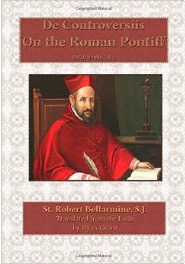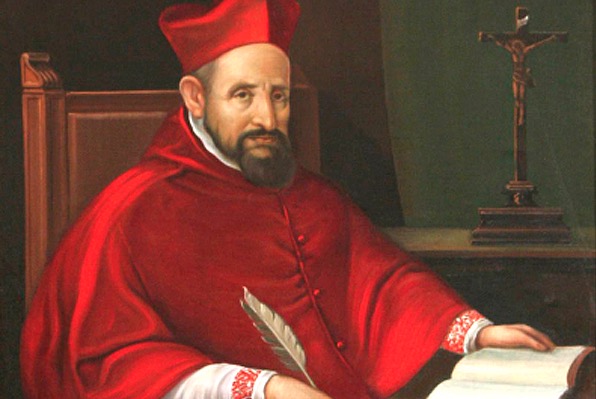A Doctor of the Church weighs in…
Can a Pope be a Private Heretic?
St. Robert Bellarmine Speaks
As we announced approximately one year ago, the monumental theological work De Romano Pontifice (“On the Roman Pontiff”) of Cardinal St. Robert Bellarmine, S.J., has now been translated into English, for the first time ever. The translator is Mr. Ryan Grant of Mediatrix Press, and the English-speaking world owes him a tremendous amount of gratitude.
The English On the Roman Pontiff has been published in two volumes, with the first volume containing Books I and II, and the second volume containing Books III, IV, and V. The first volume was first made available last year, whereas the second volume was released only a few weeks ago. Here it is:

On the Roman Pontiff – De Romano Pontifice
by Cardinal St. Robert Bellarmine, S.J.
Available in Softcover & as Kindle eBook
Cardinal Robert Bellarmine was a member of the Society of Jesus, a Jesuit. He was declared a Saint by Pope Pius XI in 1930, and was made a Doctor of the Church by the same Pope in the following year. His feast day is May 13, the same day Our Lady of Fatima first appeared in 1917. He is the patron saint of catechists and has been called the “Doctor of the Papacy”, and for good reason. His writings were a most reliable guide during the proceedings of the First Vatican Council (1869-70), which, by authority of Pope Pius IX, defined the dogma of papal infallibility and issued eloquent teaching on the Papacy, the Church, and the Magisterium. In his decree declaring St. Robert a Doctor of the Church, Pope Pius XI extolled his keen mind, his strong morals, his great learning, and his brilliant teaching, and highlighted in particular Bellarmine’s teaching authority with regard to the papacy:
But it is an outstanding achievement of St Robert, that the rights and privileges divinely bestowed upon the Supreme Pontiff, and those also which were not yet recognised by all the children of the Church at that time, such as the infallible magisterium of the Pontiff speaking ex cathedra, he both invincibly proved and most learnedly defended against his adversaries. Moreover he appeared even up to our times as a defender of the Roman Pontiff of such authority that the Fathers of the [1870] Vatican Council employed his writings and opinions to the greatest possible extent.
(Pope Pius XI, Decree Providentissimus Deus declaring St. Robert Bellarmine a Doctor of the Church, Sept. 17, 1931)
It is no surprise that when the question was raised at the Council what would happen if a Pope were to become a heretic, it was the teaching of St. Robert Bellarmine that informed the bishops’ answer:
- Vatican I and the Question of a Heretical Pope
- See Also: The Impossibility of Judging or Deposing a Pope
In the last few years, as the “pontificate” of Jorge Bergoglio (“Pope Francis”) has proven itself a bizarre, chaotic, and obviously heretical freak show, we have been seeing a number of arguments raised that a manifestly heretical Pope would remain Pope until he be deposed by an official judgment by the Church or by specific cardinals. But the arguments that are usually used to support this position are almost exclusively based on theological opinions advanced only before the First Vatican Council of 1870, whose rich teaching on the papacy makes the idea of a heretical-but-valid Pope completely untenable, as we demonstrate in the two essays linked above. The teaching of St. Robert Bellarmine, on the other hand, is typically either distorted, given secondary importance, or ignored altogether by those who would appeal to theological opinions that were permitted before Vatican I but are clearly no longer acceptable after the council and the 1917 Code of Canon Law.
Although St. Robert argued at length that a Pope who falls into public heresy would by that very fact alone immediately cease to be Pope, without the need for any official declaration, he did not believe that such a scenario was really possible to begin with. His argumentation, given in Book II, Chapter XXX, which we have also made available in full on this site, is entirely hypothetical — he explains what would be the case if such a thing could happen.
In Book IV, Chapters VI and VII, the Doctor of the Church explains why, in his view, it is not possible for a Pope to be a heretic even as a private individual. He answers various objections, including those made by certain anti-sedevacantists in our day, according to which certain Church documents seem to imply that a Pope can indeed deviate from the Faith — such as the canonical Si Papa, Act 7 of the Fourth Council of Constantinople, and the teaching of Pope Innocent III — and explains that this does not mean to suggest that papal heresy is in fact possible.
We are making the content of Book IV, Chapters 6-7, available with the kind permission of the translator, Mr. Ryan Grant (to prevent misunderstanding, we would like to clarify that Mr. Grant is not a sedevacantist). Click below:
The semi-traditionalists of our day are at a loss to reconcile the absurdity that is “Pope Francis” with the Catholic doctrines and dogmas on the Papacy. As each Catholic has the obligation to submit with docility to the Supreme Pontiff and his teachings, laws, and liturgical rites, under pain of schism, the absurdity of such a concept as a heretical-but-valid Pope becomes even more glaring. A few links for your review:
- Pope Leo XIII quashes “Recognize-but-Resist” Position
- TRADCAST 003: Refuting Eric Gajewski’s false Recognize-and-Resist Traditionalism
- Comedy Hour with John Salza: Papal Authority and the Magisterium
- Is Francis a Valid Pope? Why It Matters
- False Resistance Theology: The Pope Speaks, YOU Decide
- Indefensible Today: Suarez’s Opinion on the Question of a Heretical Pope
- The Alleged Fall of Pope Liberius, His Alleged Excommunication of St. Athanasius, and other Anti-Papal Libels
- Have the Gates of Hell Prevailed against the Catholic Church?
- Sedevacantism and Private Judgment: Are Sedevacantists just “Protestants”?
- Quick Reality Check: How Traditional are the Mainstream “Traditionalists”?
- A Listing of the Most Important Links on Sedevacantism
As we ponder the truly frightening and unprecedented situation which we have found ourselves confronted with since Angelo Roncalli (“Pope John XXIII”) claimed the papacy in 1958 and summoned the Second Vatican Council, let us never forget that this diabolical subversion of Catholicism was actually foretold, in one way or another, by a number of individuals in recent Church history, who based their predictions on their deep knowledge of Sacred Theology and the Holy Scriptures:
- Cardinal Henry Manning (1861): The Pope, the Antichrist, and the Great Apostasy
- Fr. Edmund O’Reilly (1882): ‘The Church may be without a Pope for a Long Time’
- Fr. Sylvester Berry (1921): ‘Satan will persecute the Papacy’
- Fr. Sylvester Berry (1927): ‘Satan will set up a False Church’
- Mgr. Fulton Sheen (1948): ‘Satan will set up a Counterchurch’
- Fr. Herman Kramer (1956): ‘Satan may seek to prevent a valid Papal Election’
Like her Divine Founder, the Catholic Church is undergoing the Passion: As the Mystical Body of Christ, she suffers mystically what Christ suffered physically. And like her Lord and Head, the Church too has been betrayed by those who should have defended her: The Modernists, said the great Pope Saint Pius X, “put into operation their designs for her undoing, not from without but from within. Hence, the danger is present almost in the very veins and heart of the Church, whose injury is the more certain from the very fact that their knowledge of her is more intimate (Pius X, Encyclical Pascendi, n. 3; cf. Mk 14:10).
Unfortunately, just as many abandoned our Blessed Lord in His darkest hour, so many are now abandoning the true Church, either for a false church that is more appealing to them, or for the pleasures of the world. Hence our Divine Savior exhorted us to persevere to the end and pray much, so as not to fall away in time of temptation (cf. Mt 25:1-13; Mt 26:41; Mk 4:2-20; Lk 18:8; Rom 11:21-22).
Clearly, the “operation of error” which St. Paul warned against in 2 Thessalonians 2:10 is upon us. May the teaching of St. Robert Bellarmine, confirmed and reinforced by the solemn Magisterium of the Church, ever be our guide, and may his intercession ever be our help and protection!
St. Robert Bellarmine, pray for us that the Lord may deign to grant to His Holy Church once again a true Roman Pontiff, who will condemn the diabolical sect begun by Angelo Roncalli and restore the True Catholic Church to her former glory in the sight of all doubters!






One Response to “Can a Pope fall into Heresy as a Private Individual? St. Robert Bellarmine speaks”